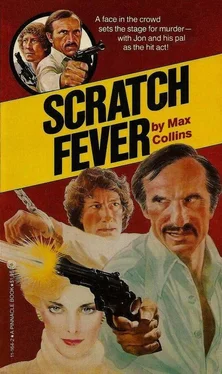She’d first met Nolan at the Tropical, a motel he was running for the Chicago Family. Initially, she’d been a waitress there, and a bad one: it was when she got called on the carpet for spilling food in customers’ laps that she ended up in Nolan’s lap, and that pretty much was where she’d stayed the rest of that summer.
Then her father had called and told her her mother had had a stroke, and it was back to Ohio for Sherry. There would be no time to finish up college (she had a two-year community college degree and had hoped to get a four-year business degree) and the only job she could find was waitressing at a Denny’s. Which was better than hell, but just barely. And when she wasn’t waitressing at Denny’s, she was looking after her mother, which she didn’t mind, because she loved her mother, but it was sad. So very sad.
Three months ago her mother had died.
Sherry started back to college, and only a month in, she knew she couldn’t hack it. It wasn’t that she was stupid; she wasn’t particularly smart, either, but it wasn’t that she was stupid. More like bored. She was more bored than waitressing at Denny’s. It was a rare week that she didn’t think about her summer with Nolan. She had even cried herself to sleep a couple times, missing him, wishing she could have stayed with him.
Then, last month, he called. She didn’t even know how he’d managed to track her down, but he had. And he wanted her to come live with him.
“I need a hostess at my new restaurant,” he said.
“That’s like a waitress, right?”
“Right. Only you don’t spill shit on people.”
“But Logan, that’s my speciality.”
“I know. And can the Logan stuff.”
Logan was the name she’d known Nolan by at the Tropical.
“How come?”
“I’m using Nolan here. So don’t call me Logan anymore. It’ll just confuse people.”
“Well, I’m already confused.”
“That’s how I like you.”
“I’m also broke.”
“I’ll send plane fare.”
“I’m on my way, then.”
Their month together had been a lot of fun, if not a honeymoon. Nolan wasn’t altogether humorless, though when he did make a joke, it was so dry, you could miss it if you weren’t looking. They made good love together. They got along. He didn’t insist that she cook — one thing he wasn’t stingy about was taking her out to eat, though he did collect receipts to deduct on the meals on his taxes, claiming he was “checking out my competition.” And when she did cook, he didn’t complain, even when the results (her Tuna Surprise, for instance) were less than spectacular. Memorable, yes; spectacular, no.
During the first week, the Nolan/Logan thing had been a running gag with them; she’d kept right on calling him Logan, till he finally threatened to turn her over his knee and spank her. She dropped her drawers and said go right ahead. And he had, and more.
But afterward he said, “Seriously — get used to calling me Nolan. I got to stick by one name in one place.”
And from then on it was strictly Nolan.
She was watching a “Mission: Impossible” rerun when she remembered the answer phone: she hadn’t checked for messages. She went into the kitchen, and the red light was flashing on the little tape unit by the phone on the counter. She rewound the tape and played it back.
“Nolan, this is Jon. I’m calling from a place called the Barn, just this side of Burlington. I’m here with my band.”
Jon. That was the kid Nolan was always mentioning. The one who was his partner or something, back when Nolan wasn’t respectable. She’d never met Jon, but she knew he was someone important in Nolan’s life.
“This is going to sound crazy,” the voice was saying, sounding tinny coming out of the small speaker, “but I think I saw that bitch Julie. No, scratch that: I did see her, no mistaking it. She is not dead, Nolan.”
What was this about? The kid sounded scared.
“Now the worse news: she saw me. Nolan, if she’s been playing dead, she’s not going to be happy I found out she’s alive. She’s going to cause trouble. So what I’m going to do is finish out the night — it’s just before midnight, as I’m talking — and I’m going to confront her, if I can get the chance, and cool this down.”
Very nervous, Sherry thought — even desperate.
“In the meantime, if you get home by, oh, twelve-thirty, get in your car and drive down here. Come via 61 all the way, so that if for some reason I end up coming after you, I’ll spot you on the highway. It should take you about an hour and forty-five minutes to two hours to get here; the band quits at one-thirty, the club stays open till two, and then it’s another half-hour or forty-five minutes of tearing down equipment and loading. Which means there’ll be too many people around for her to try anything till three, I’d say. Or anyway, two-thirty. So if you can leave there by twelve-thirty, get down here. Otherwise, stay put and wait for me to get back to you.”
It was a disturbing message. She didn’t understand it, but that only made it all the more disturbing; she rewound it, listened to it again, then rewound it again so that Nolan could hear it when he got home.
But one thing was certain: the twelve-thirty deadline was past; it was quarter till one now.
She went back to the TV, found an old crime movie with Cornell Wilde, which she started to watch, then switched to “Second City TV.” The crime movie was hitting just a little too close to home.
It took only about four minutes of “Second City” to get her laughing; she hadn’t forgotten the disturbing answer-phone message, but it wasn’t dominating her thoughts now. But she did wonder when Nolan would get here.
That thought had barely flicked through her mind when she heard the footsteps on the stairs and smiled. God, he was quiet coming in. Nobody was that quiet Usually, the dog would have yapped at him, though, happy to see him. Not tonight. That was odd.
Still on the couch, she turned her head and glanced back at Nolan.
Only it wasn’t Nolan.
It was two men: one of them, disturbingly, looked a little like Nolan, but a younger Nolan, about thirty-five, with no mustache and short, curly, permed hair that gave him a Caesar sort of look. He was in black — black slacks, black turtleneck, black gloves. The other man was coming up the stairs behind the Nolan clone, in shadows; she couldn’t see him yet.
She reached for a heavy sculpted glass paperweight on the coffee table near the couch.
It exploded before she could touch it, shards of glass nicking at her arm. Choking back a scream, she clutched her blood-flecked arm with her other hand and glanced back at the men. The Caesar type had an automatic in his hand; there was an attachment on the end of it — a silencer? — and smoke was curling out the barrel. He was smiling faintly.
“I don’t like shooting at Art Deco pieces,” the man said. His voice was a smooth, curiously pleasant baritone. “Don’t make me shoot any more furniture, dear. I’d sooner shoot you.”
She felt very naked in her Frederick’s nightie, and flashed onto an absurd thought: Thank God I didn’t go crotchless!
Then she saw the other man. He, too, looked familiar. Then she placed him: he was a ringer for that guy that used to be on that Angie Dickinson police show. But, again, younger — perhaps thirty. He had curly, permed hair too, and a silly smile that scared her more than the tight, controlled smile of the other man. This one, too, was in black; this one, too, had an automatic with an attachment.
The first man came over to her, with a gloved hand brushed the glass from the coffee table, and sat down, the gun casual in his hand, but pointing at her. He was tanned. Handsome, in an unsettling way.
Читать дальше












